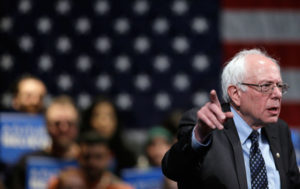What Should Left-Wing Foreign Policy Look Like?
Perhaps what’s missing from the 2016 presidential race “isn’t the anti-imperialist [Bernie] Sanders” but “the antiwar movement he was once part of, and which no longer exists." Bernie Sanders. (Key Studio / CC-BY-2.0)
Bernie Sanders. (Key Studio / CC-BY-2.0)
Bernie Sanders. (Key Studio / CC-BY-2.0)
Remember the Bush years, when it was safe, as the editors of n+1 say in the magazine’s Spring 2016 issue, “to accuse the government of both criminality and insanity” for its foreign policy? Not so in the Obama era, during which policy discussions even among liberals narrowed to a slight “range of options presented as the full spectrum of reasonable action”: “[A]rm the Syrian rebels? Stay the course with a bombing campaign? Send a trickle of ‘advisers,’ softly and quietly, to invade Syria?”
This development owes a great deal to the disappearance of the antiwar movement, the editors argue. Consider, for example, that Thomas Piketty — “an economist concerned with inequality and distribution” — “can publish the biggest academic best seller of the decade,” “Capital in the Twenty-First Century,” while a foreign-policy expert like Noam Chomsky, who presumes American hegemony is “not de facto a good thing,” gets nowhere in the national press.
“So long as the seeking of national political office, the taking of state power, continues to be a goal of the left, it is incumbent on us to figure out what we might do–what ought to happen should some Chomsky-like figure (Bernie!) happen to find himself attaining the presidency.”
What should be the foreign policy goal of such a figure and the movement behind them? The dismantling of the idea, which has guided the U.S.’s relationship with the rest of the world since the end of World War II and almost always produced its opposite, “that American power” exists “to ensure the security of free markets and peoples by any means necessary,” the editors write.
They elaborate:
The obvious response to the arguments in favor of heightened national security is that every expansive step in the war on terror has made the US and the world increasingly less safe; that in pursuit of “security,” security itself has been compromised. The pursuit of extraregional hegemony by the US has been a disaster, unmotivated and unnecessary. The multiplication of actual threats and violence to countries everywhere has been the consequence.
But to charge that security politics has produced insecurity is to give legitimacy to security politics. The real first step to a left foreign policy is simply to acknowledge the following: US hegemony not only has been a moral and human catastrophe but also is in decline. What US policy has masked is the growth of world powers besides the US. The decline of US hegemony was already visible during the Bush Administration, when Latin American countries, led by Brazil, began to seek alliances with Iran, Russia, and China. It has become obvious in the Syrian Civil War, which several powers—Iran, Russia, Turkey, Saudi Arabia, and Qatar—have been exploiting to pursue ends hostile to each other and often to the US (which is itself unwilling or incapable of exerting influence the way it might have years ago). …
To imagine a world in which American primacy is no longer taken for granted requires a scaling back of aims and a deconstruction of the project of “security.” It requires, above all, a slow and steady revision of the American worldview, in which the presumption of leadership has been discarded, and a new, less hospitable order has been accepted. …
Such an intellectual shift would require a realistic reckoning with what forces for liberation exist in the world, without extravagant hopes or illusions—call it a “left realism.” Does this mean that a nation must refuse to “intervene,” that a respect for the nation-state and its sovereignty trumps all? It doesn’t, and the historical record contains many instances where a timely intervention might have halted a war: for example, against the Germans prior to the invasion of Poland. But the record is more full of overweening, preventive actions that prolonged and augmented catastrophe, such as the British intervention in World War I, when a swift German victory over France might have been preferable. …
This has not stopped some on the left from seeking more traditional kinds of solidarity. Much of the critique of American foreign policy over the cold war years was buoyed by support for leftist governments or movements, from the Cuban revolution to Nicaragua. Though such movements have grown sparse with the decline of decolonization and international socialism, today an analogous glimmer comes from the state of Rojava in northern Syria, where, improbably enough, local Kurds have founded an egalitarian society inspired by the work of the American anarchist Murray Bookchin, transmitted through the prison writings of Kurdistan Workers’ Party founder Abdullah Öcalan. Support for this movement has been strong on the Anglo-American left (rightly so), above all in the writings of David Graeber, who has compared the situation of the Rojava revolutionaries to that of the anarchists in the Spanish Civil War—and argues that they should receive similar support. …
But such thinking can easily lead to the embrace of a military solution centered on the US: the Al Jazeera English (and generally antiwar) reporter Mehdi Hassan and (more predictably) Joel Gillin of the New Republic have argued for arming Kurdish rebels. American airstrikes have already been helping Kurdish forces combat the Islamic State, which at the time of this writing is on the verge of defeat in Syria. But what then? The Kurds are only being used by American powers as a tool: if and when ISIS in Syria is defeated, their American support will dry up. They can’t move outside their territory, and they won’t topple Assad. And it is absolutely right—imperative, even—for social movements in the US to support democratic allies against Assad. But a left foreign policy cannot simply mean backing any leftist project that happens to come along.
We should be circumspect in our enthusiasms not least because US involvement in Syria has served a broader and older goal: the war on terror. This war, with its omnipresent surveillance and planet-spanning assassinations, represents the most massive expansion of American militarism under the rubric of “security” since the beginning of the cold war. Reflexive interventionism has only been augmented by the rationale of a conflict whose ambit is everywhere. With drone strikes and support to allies bombing others (such as the Saudi war on the Houthis in Yemen), the US is intervening all the time. Nixon’s 1968 campaign slogan, “Peace with honor,” has been traded for war without end.
The consensus around intervention—often called, after a 2001 UN commission, the “Responsibility to Protect”—has become intimately bound up with the war on terror. The project of any leftist government would start here, by dismantling both the war apparatus and the presumption that the US’s existence is predicated on guaranteed intervention. Amazingly, it is Obama himself, in the sunset of his otherwise frustrating and belligerent presidency, who has begun to seek out ways to change the attitude of the “international community” toward intervention. In this respect, the characteristic Obama is not the one who declared a red line, but the one who largely refused to act on it and has rejected calls to do more. This is the same President who privately has taken to calling Libya a “shit show.” Fine words, but it’s his shit show. A left presidency would be one in which this realistic appraisal would come as a matter of habit, rather than after months or years of prevarication and worse.
Read the full essay here.
—Posted by Alexander Reed Kelly.
Your support matters…Independent journalism is under threat and overshadowed by heavily funded mainstream media.
You can help level the playing field. Become a member.
Your tax-deductible contribution keeps us digging beneath the headlines to give you thought-provoking, investigative reporting and analysis that unearths what's really happening- without compromise.
Give today to support our courageous, independent journalists.









You need to be a supporter to comment.
There are currently no responses to this article.
Be the first to respond.